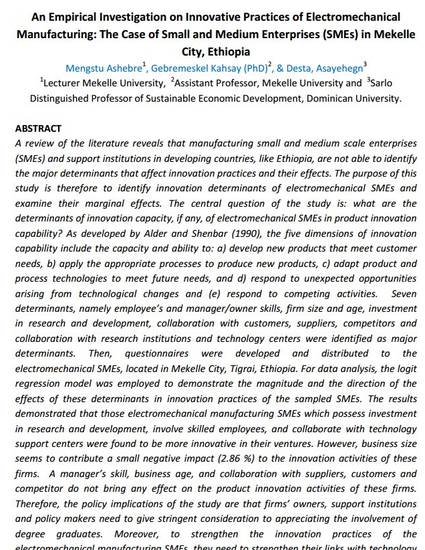
Article
An Empirical Investigation on Innovative Practices of Electromechanical Manufacturing: The Case of Small and Medium Enterprises (SMEs) in Mekelle City, Ethiopia
International Journal of Business and Behavioral Sciences
(2013)
Abstract
A review of the literature reveals that manufacturing small and medium scale enterprises (SMEs) and support institutions in developing countries, like Ethiopia, are not able to identify the major determinants that affect innovation practices and their effects. The purpose of this study is therefore to identify innovation determinants of electromechanical SMEs and examine their marginal effects. The central question of the study is: what are the determinants of innovation capacity, if any, of electromechanical SMEs in product innovation capability? As developed by Alder and Shenbar (1990), the five dimensions of innovation capability include the capacity and ability to: a) develop new products that meet customer needs, b) apply the appropriate processes to produce new products, c) adapt product and process technologies to meet future needs, and d) respond to unexpected opportunities arising from technological changes and (e) respond to competing activities. Seven determinants, namely employee’s and manager/owner skills, firm size and age, investment in research and development, collaboration with customers, suppliers, competitors and collaboration with research institutions and technology centers were identified as major determinants. Then, questionnaires were developed and distributed to the electromechanical SMEs, located in Mekelle City, Tigrai, Ethiopia. For data analysis, the logit regression model was employed to demonstrate the magnitude and the direction of the effects of these determinants in innovation practices of the sampled SMEs. The results demonstrated that those electromechanical manufacturing SMEs which possess investment in research and development, involve skilled employees, and collaborate with technology support centers were found to be more innovative in their ventures. However, business size seems to contribute a small negative impact (2.86 %) to the innovation activities of these firms. A manager’s skill, business age, and collaboration with suppliers, customers and competitor do not bring any effect on the product innovation activities of these firms. Therefore, the policy implications of the study are that firms’ owners, support institutions and policy makers need to give stringent consideration to appreciating the involvement of degree graduates. Moreover, to strengthen the innovation practices of the electromechanical manufacturing SMEs, they need to strengthen their links with technology centers and research institutions and focus on research and development. Among other things, these strategies are likely to transform the SMEs in Mekelle City, Tigrai, Ethiopia from being sheltered in a closed economy to developing value through new products, processes, and organizational systems that are needed to develop competitive advantage in the global economic sector that requires fast technological change.
Keywords
- Electromechanical Manufacturing SMEs,
- Innovation Activities,
- Innovation Determinants
Disciplines
Publication Date
May, 2013
Citation Information
Mengstu Ashebre, Gebremeskel Kahsay and Asayehgn Desta. "An Empirical Investigation on Innovative Practices of Electromechanical Manufacturing: The Case of Small and Medium Enterprises (SMEs) in Mekelle City, Ethiopia" International Journal of Business and Behavioral Sciences Vol. 3 Iss. 5 (2013) Available at: http://works.bepress.com/asayehgn_desta/16/
